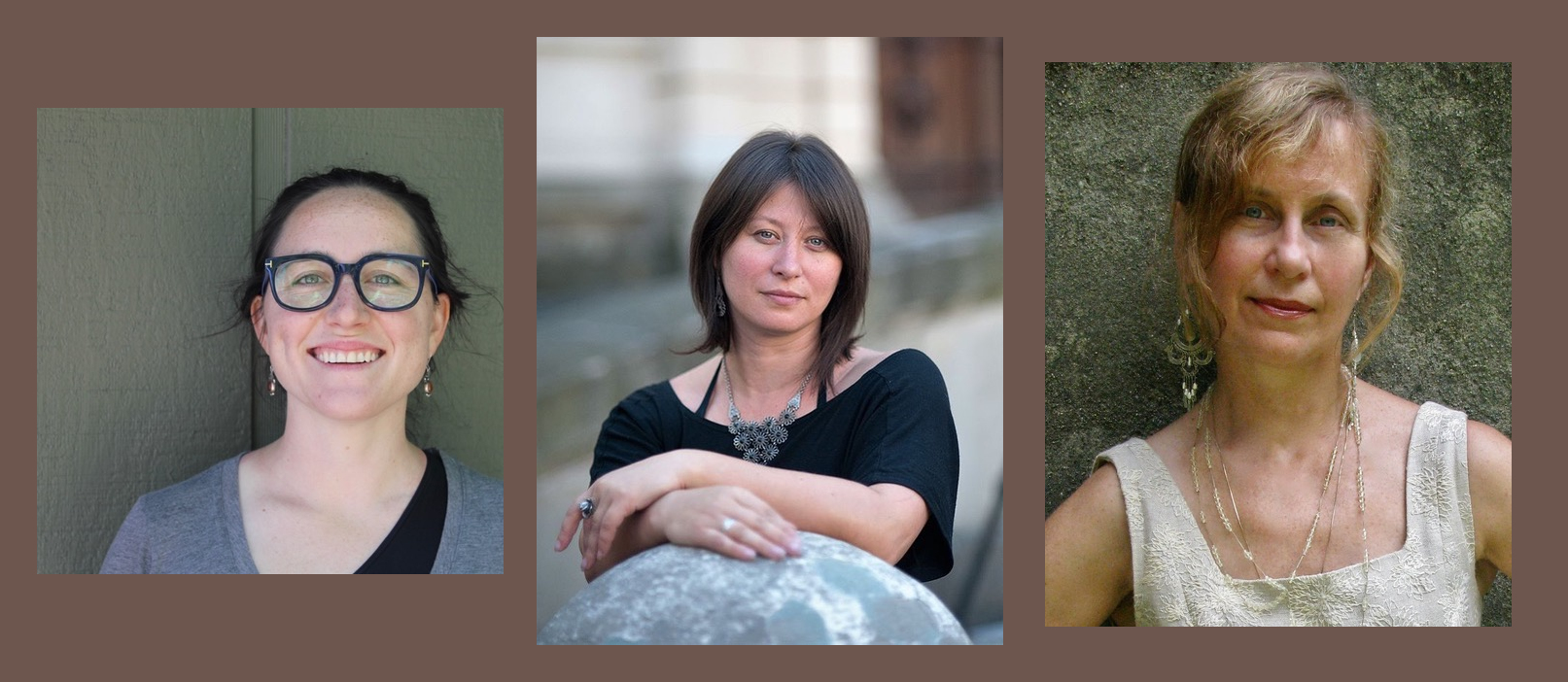Photograph (L to R): Ali Kinsella, Halyna Kruk, Dzvinia Orlowsky
Honorable Mention, Diana Der-Hovanessian Prize, selected by J. Kates
Halyna Kruk is an award-winning Ukrainian writer, translator, educator, and literary critic. She is a professor of literary studies at the National University of Lviv where her research focuses on medieval literature in Ukraine. She also writes children’s fiction which have been translated into 15 languages.
Ali Kinsella has been translating from Ukrainian for ten years. Published works include essays, poetry, monographs, and subtitles to various films. She won the 2019 Kovaliv Fund Prize for her translation of Taras Prokhasko’s Anna’s Other Days. A former Peace Corps volunteer, Ali lived in both western and central Ukraine for nearly five years.
Dzvinia Orlowsky’s most recent poetry collection, Bad Harvest, was a 2019 Massachusetts Book Awards “Must Read” in Poetry. Her co-translations with Ali Kinsella from the Ukrainian of Halyna Kruk’s poetry is forthcoming from Lost Horse Press (2024). Her new poetry collection, Those Absences Now Closest, is forthcoming from Carnegie Mellon University Press (2024).
In a Small Provincial Chinese Town in a small provincial Chinese town of only 2–4 million where shopkeepers can’t understand what I need— even with hand gestures I feel like a rope knotted at one end, as alone as I always wanted to be surrounded by people like me, with no excess desire to explain myself, to understand everyone or to be understood, it’s enough to be myself and to watch how morning gains momentum, untwisting in the air, how local butchers saw carcasses in building passageways, how the shop assistant across the way singes pig trotters, how local housewives join in lively conversation over the shiitakes spread out in a row directly on the sidewalk, they’re probably talking about me, glancing over again and again I’m glad I don’t understand them. Sometimes we need not to understand, to start over from the beginning, from the most general concepts, from common roots, from one’s own body, I can only speak the language of the children who at the intersection have surrounded me cautiously touching, running away, showing me the direction of my hotel, asking how I like it, who I am, where I’m from, how they live here oh how I understand them the language of children is the same everywhere cheerful, ringing, mouths hanging wide open, an inquisitive finger pointing Halyna Kruk Translated by Ali Kinsella and Dzvinia Orlowsky У маленькому провінційному китайському містечку у маленькому провінційному китайському містечку мільйонів так на 2-4, де ніхто із продавців не може зрозуміти, чого мені треба, навіть за допомогою мови жестів, відчуваю себе линвою, причепленою тільки з одного боку, самотньою рівно на стільки, на скільки мені завжди хотілося у світі собі подібних, без надмірного бажання пояснити себе, достукатися. я не хочу розуміти всіх і бути зрозумілою, мені достатньо бути собою і дивитися, як цей ранок набирає обертів, розкручуючись у повітрі як місцеві м'ясники розрубують туші худоби прямо в проході між будинками, як продавець із магазину навпроти обсмалює свинячу ратицю, як місцеві домогосподині жваво обговорюють щось над грибами шиїтаке, розкладеними на ряднині прямо на тротуарі, напевно, мене обговорюють, раз-по-раз позиркуючи як добре, що я не розумію. часом людині треба нічого не розуміти, починати все від початку, від найзагальніших понять, зі спільного кореня, із власного тіла я говорю тільки мовою дітей, які обступають мене на перехресті несміливо торкаються, відбігають, показують, у якому напрямку мій готель, питають, як мені тут, хто я і звідки, розповідають, як їм тут живеться, як я їх розумію мова дітей скрізь однакова - весела, дзвінка, із відкритим від цікавості ротом із допитливим вказівним пальцем Гали́на Крук

